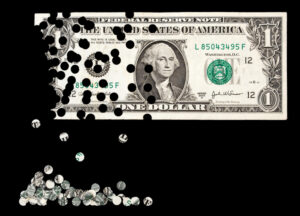The Rule of Planned Money
The comments below are an edited and abridged synopsis of an article by Garet Garrett
“As the hungry dollar devours its own purchasing power, we may think we are going to find out what happened to the fabulous snake that swallowed itself. But we won’t; and if we did, it would add perhaps nothing to the sum of human wisdom.”

“There is a long history of monetary experience. It tells us that government is at heart a counterfeiter and therefore cannot be trusted to control money, and that this is true of both autocratic and popular government. The record has been cumulative since the invention of money. Nevertheless it is not believed.”
“There is also a history of sound money, and if its lessons are likewise disregarded, what shall one conclude but that monetary delusions are, by some strange law of folly, recurring and incurable?”
“There was a century of sound money. During one hundred years preceding World War I, government touched money hardly more than to establish standards of weight and measure, to lay down the laws of liability and to license bankers.”
“In that century the wealth of the world increased more than in all preceding time of economic man.”
“In that century it was business that controlled money, banking and credit by laws of its own; and by that fact the scope of government was limited.”
“In that century government was confined and enterprise was released, with the result, beyond the prodigious increase of wealth, that never before had political man been so free.”
“In all that era of free exchange, free price, and sound money there were two things responsible governments did not do.”
The first thing governments did incorrectly was create fiat money; the second thing was that governments did not manipulate money and credit. Such terms as ‘planned money’ or ‘managed currency’ were unknown. Garrett explores these topics in depth.
